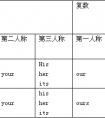用所给动词的适当形式填空。1. There__________ (be) some money in the purse. 2. I have something else __________ (do). 3. This garden is big. That garden is_-七年级英语
⑧other, the other, others, the others, another
other具有名词和形容词性质,既可指人,亦可指物。other常与定冠词the连用。
不定冠词an与other连用则组成another。other只作形容词或代词,表示“其他的,别的”,不可单独使用。
例如:Do you have any other questions?
the other作形容词或代词,特指两者中或两部分的另一个或另一部分。
例如:The bookshop is on the other side of the street.
others相当于“other+名词”,泛指“别的人或物”,只有名词性用法。
例如:Some are planting trees, others are watering them.
the others相当于“the other+名词”,表示“剩下的,其余的”,特指除此之外的全部 人或物。
例如:There are forty-six students in our class. Two of them are foreign, the others are all Chinese.
another作形容词或代词,泛指三个或三个以上不定数目中的“另一个”。
例如:This pen is too expensive, please show me another.
⑨either, neither
either指“两者中的任何一个”;neither指“两者中无一”,具有否定意义。
例如:You can take either half.
Neither of the books is good.
⑩many, much, most
many和much具有名词和形容词的性质,都表示“许多、大量”。
Much一般只能指代或修饰不可数名词,many只能指代或修饰复数可数名词。Most指“大部分、大多数”。
例如:Many boys like playing soccer.
We have much homework to do every day.
Most students think so.
(11)few, a few, little, a little
a few 和a little 意为“少数、少量”,其意义是肯定的。
A few指代或修饰复数形式的可数名词,a little指代或修饰不可数名词。
Few 和little意为“几乎一点没有”,具有否定意义。
例如:He has a few friends here.
Hurry up! There is little time left.
不定代词大都可以代替名词和形容词,在句中作主语、宾语、表语、定语和状语。
位置
不定代词+形容词
不定代词+to do
作主语
Both of them are teachers.他们两人都是教师。
作宾语
I know nothing about this person.我对这个人一无所知。
作表语
This book is too much for a child.这本书对一个小孩来说太难了。
作定语
There is a little water in the glass.玻璃杯里有一些水。
作状语
I can't find my book anywhere.我在任何地方都不能找到我的书。
修饰不定代词的词,一般情况下要后置。
考点名称:形容词的比较级,形容词的最高级
- 形容词的比较级:
当两种物体之间相互比较时,我们要用形容词或副词的比较级;
当相互比较的物体是三个或三个以上时,我们就要用形容词或副词的最高级。 形容词的比较级和最高级的特殊变化规则:
一、少数单音节词前面加 more-, most- 构成比较级和最高级
tired ---- more tired , most tired
fond ----- more fond , most fond
glad ----- more glad , most glad
bored ---- more bored , most bored
pleased---- more pleased , most pleased二、不规则变化
good /well------- better ,best
bad/badly/ill------ worse , worst
many/much-------more , most
little ------ less , least
far ---- farther, farthes / firther , furthest
old ---- older , oldest (GA)
---- older , oldest / elder , eldest (GB)三、下列形容词和副词的比较级和最高级有两种形式
cruel----- crueler, cruelest /more cruel , most cruel
strict---- stricter , strictest /more strict , most strict
often----- oftener , oftenest / more often , most often
friendly------ friendlier , friendliest / more friendly , most friendly
clever----- cleverer, cleverest / more clever , most clever四、下列形容词和副词没有比较级和最高(即表示”最高程度”或”绝对状态”的形容词和副词没有比较级和最高级)
empty , wrong , perfect , unique , extreme , excellent , favourite (GB)/ favorite (GA) , true , right , correct , extremely ...- 形容词的比较级和最高级用法:
形容词比较等级用法:
1.没有比较对象时,用原级。
I have a new computer.
2.两者比较,程度相同。
A+系动词+as+adj.+as+B.
Our school is as beautiful as theirs.
3.两者比较,程度不同。
A+系动词+not as+adj.+as+B.
The weather here is not as hot as that in the south.
4.A比B更…
The earth is bigger than the moon.
5.比较级前可以用much,even,still,far,a lot,a little,a bit,any等修饰。
Your room is much bigger than mine.
I’m a little shorter than her.
6.用比较级可以表示最高级含义:
John is stronger than any other boy in his class.=John is stronger than any of the other boys.
两者不属于同一范畴,不能用other.
Chongqing is bigger than any city in Sichuang.
7.“比较级+and+比较级” 表示“越来越…”
China is becoming more and more beautiful.
Days are getting longer and longer.
8.用the+比较级,the+比较级 表示”越…就越…”.
The busier he is, the happier he feels.
9. Which/Who+is+比较级 A或B?
A和B哪一个/谁更…?
Which is better,this one or that one?
最高级用法:
表示三者或三者以上的人或物的比较,一个在某方面超过其他两个或多个时,用最高级,结构是
主语+系动词+the+形容词最高级+of/in短语。
This story is the most interesting of the three.
1. one of the+形容词最高级+名词复数
它的意思是最…之一。
English is one of the most important languages in the world.
2. which/who…+is+形容词最高级
“…最...”
Which is the heaviest,the horse,the sheep or the elephant?
3.最高级前可以用序数词
The Yellow River is the second longest river in China. - 形容词的比较级和最高级的变化规则:

![—I want to know if ______ a concert in our school hall this weekend. —Yes. Nancy told me about it. [ ]A. there will have B. there will be C. will there be -九年级英语](http://www.00-edu.com/d/file/ks/4/2/there be juxing/2020-02-28/small8bcf29e494d6f99c2d7c4286c4836a101582899344.jpg)
![There_____ a potato and two tomatoes on the table. [ ]A. isB. areC. hasD. have-七年级英语](http://www.00-edu.com/d/file/ks/4/2/there be juxing/2020-02-28/small596b7df57071a5318d44b4246a8dfcf71582899941.jpg)

![Will there___any schools in the future?[ ]A. isB. areC. amD. be-七年级英语](http://www.00-edu.com/d/file/ks/4/2/there be juxing/2020-02-28/smallfaad594ad286847556f8b2a7bf4e6da41582899915.jpg)
![There is going to _____English movie tonight. [ ]A. be B. be an C. have D. have an -八年级英语](http://www.00-edu.com/d/file/ks/4/2/there be juxing/2020-02-28/small684c03bf16377c6f94e9f828954421a91582899285.jpg)
